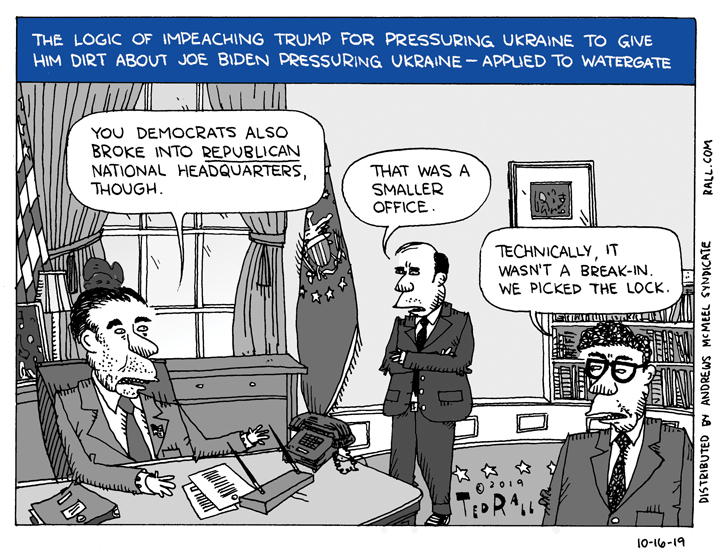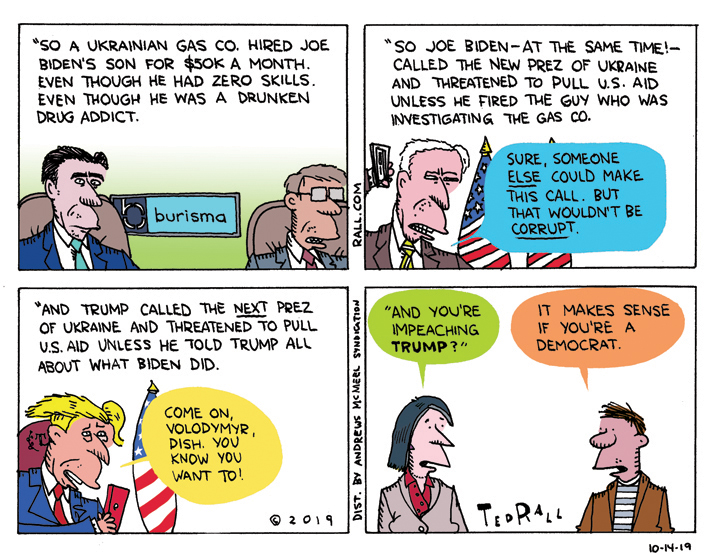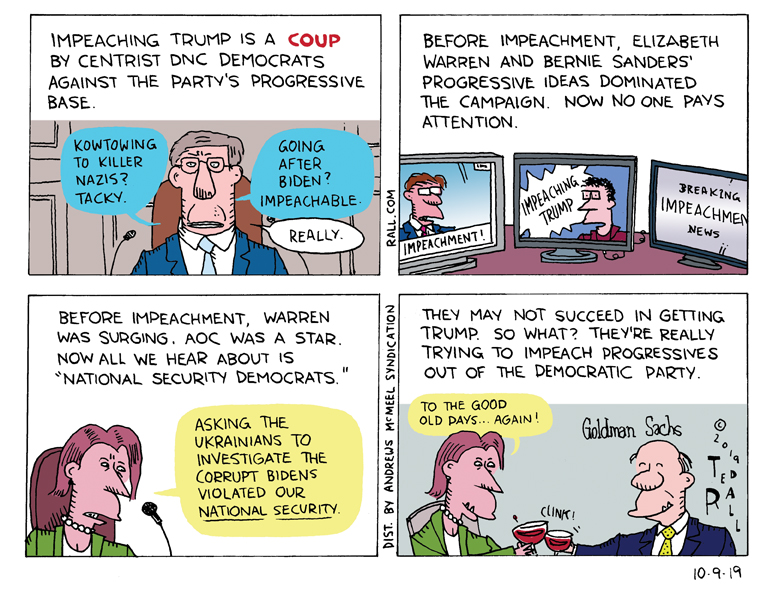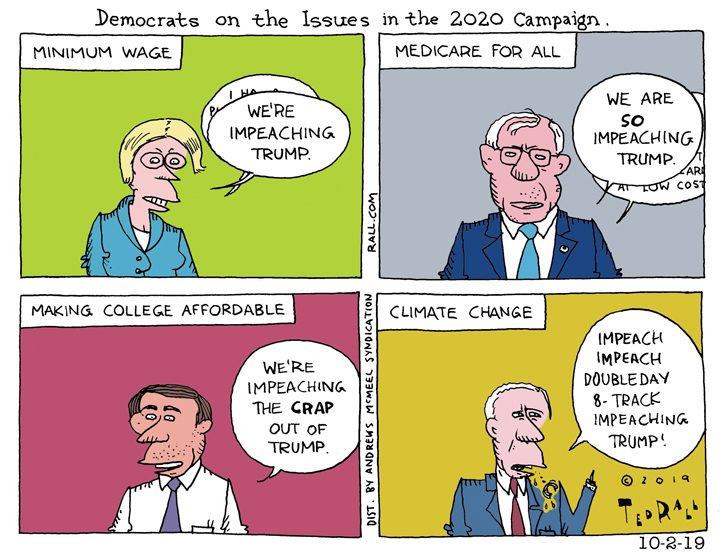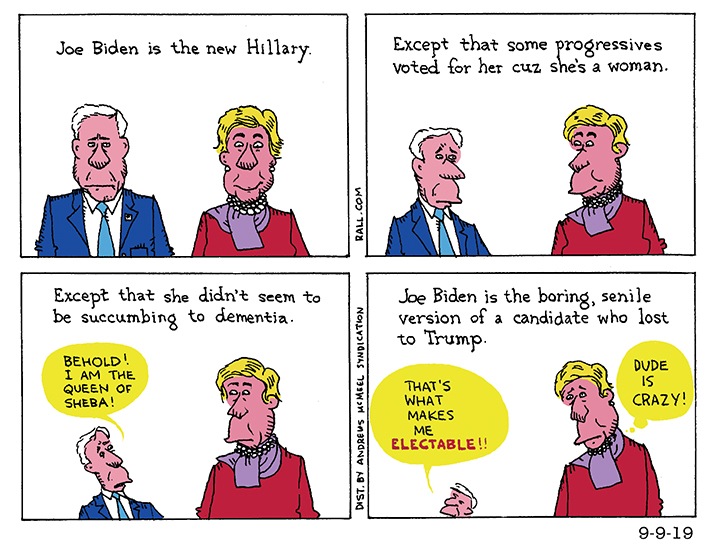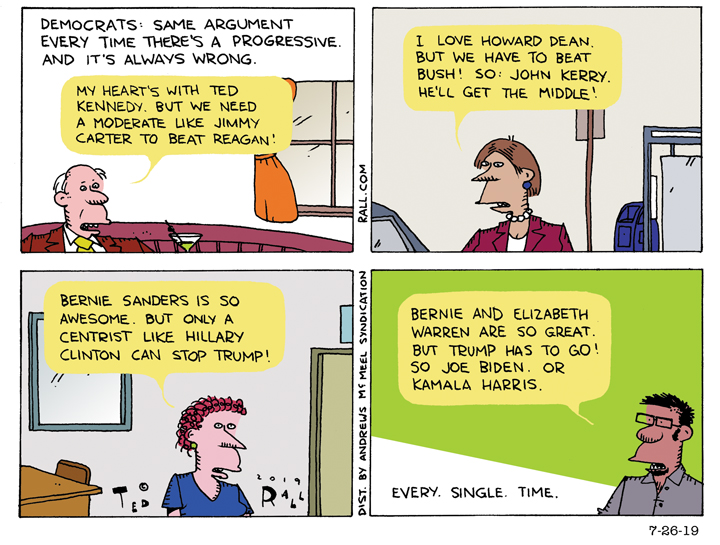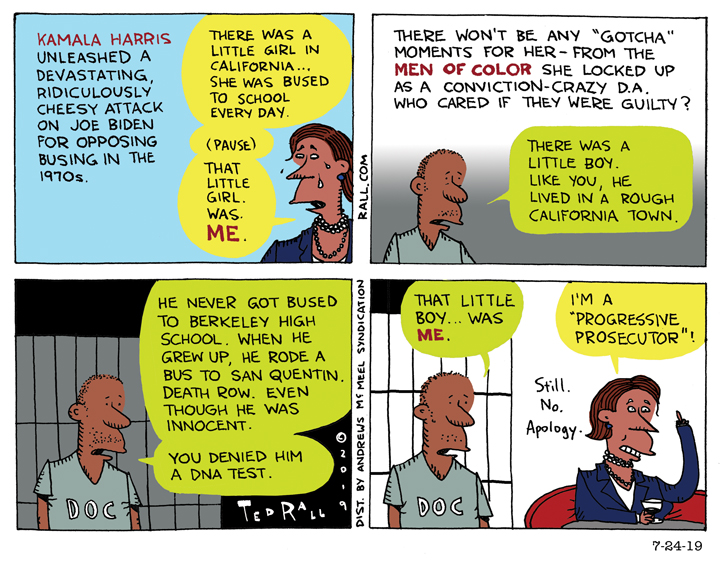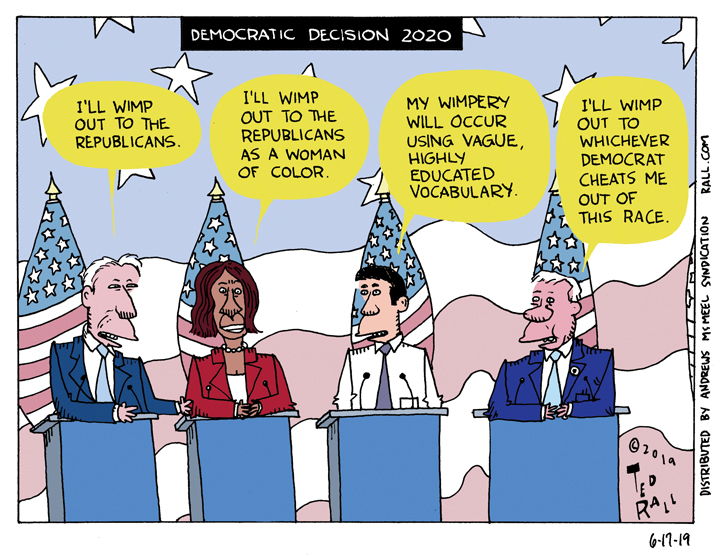The most recent impeachment hearings had a clear narrative. One person did something wrong, the president. The other party did not. In Watergate, the Republicans were guilty of dirty tricks including breaking into Democratic national headquarters. With Bill Clinton, he was the one who lied under oath and had sex in the oval office. The current impeachment inquiry into Donald Trump being led by the Democratic House of representatives doesn’t have any such clear narrative.
The Impeachment of Trump is a Coup d’Etat by DNC Centrists Again
Democrats would like to think that they are all united around the goal of impeaching Donald Trump. But when you scratch the surface what you find is that the impeachment of Donald Trump is less about getting rid of a sitting president and more about regaining control of the Democratic Party from the insurgent progressives who have taken it over since Bernie Sanders.
The Impeachment of Trump Is a Deep-Democratic Coup Against Elizabeth Warren
/cdn.vox-cdn.com/uploads/chorus_image/image/62672208/GettyImages_871802910.0.jpg)
Some Republicans see the Ukraine/Biden impeachment inquiry as a deep-state coup attempt against President Trump. Some progressives are beginning to scratch the surface of an alternative, but equally cynical, analysis that I think leftists ought to consider:
The impeachment of Donald Trump is a DNC/centrist coup attempt against progressives inside the Democratic Party.
Democrats could have launched impeachment proceedings over any number of more compelling issues: Trump’s child separation policy at the border, the Muslim travel ban, emoluments, the president’s erratic behavior on social media. Why the Ukraine/Biden affair?
The House inquiry is hardly ideal from a framing perspective. The only conceivable reason that the Ukrainian natural-gas company Burisma hired Vice President Biden’s screw-up drug addict alcoholic son, with zero experience in the energy sector, to sit on its board of directors for $50,000 a month was that he was the vice president’s son. Vox notes that “the situation constituted the kind of conflict of interest that was normally considered inappropriate in Washington.” Pre-impeachment, no one knew about this sleaze.
Knowing that his worthless son was working a no-show “job” there for a company brazenly trying to buy his influence, Vice President Biden ought to have been the last Obama Administration official to call the president of Ukraine about anything. Democratic leaders, corporatists to a man and firmly on team Biden, nonetheless are aware that their impeachment inquiry risks exposing their preferred candidate to the kind of scrutiny that can lose an election.
Biden apologists like the New York Times’ resident conservative columnist Ross Douthat are furiously spinning the argument that Americans should ignore Biden’s corruption to focus on Trump’s worse corruption. “Hypocrisy is better than naked vice, soft corruption is better than the more open sort, and what the president appears to have done in leaning on the Ukrainian government is much worse than Hunter Biden’s overseas arrangements,” argues the Dout. But impeachment is a political, not a legal (or legalistic) process. We knew what Trump was when we elected him; this point goes to the president.
So why go after Trump over Ukraine/Biden and not, say, the fact that he’s nuts?
Risks aside, the Democrats’ Ukraine investigation—not successfully, I think, but anyway, it tries—to rescue Biden’s flagging campaign by transforming him into a victim. Liberals love victim narratives.
And now the crux: Elizabeth Warren. When Nancy Pelosi announced the impeachment inquiry, the self-styled progressive from Massachusetts was rising in the polls so fast that many analysts, me included, believed that she had become the most likely nominee. I still do. That goes double following Bernie Sanders’ heart attack, which fuels concerns about his age.
As impeachment proceedings do, the current effort to sanction Trump—remember, odds of getting 67 senators to vote to remove him from office are exceedingly long—will dominate news coverage as long as they go on. It’s going to be impeachment, impeachment, impeachment, 24-7.
The drone of impeachment will eclipse Warren’s remarkably disciplined campaign. She has a plan for everything but the media won’t cover them. Warren trails Biden on name recognition; how will voters get to know her? I’d be spitting bullets if I were her campaign manager.
As I’ve written for The Wall Street Journal, progressive ideas are dominating the current presidential campaign cycle on the Democratic side. Most of the top candidates have endorsed Bernie Sanders’ key 2016 promises: free college, Medicare for All, $15 minimum wage. Nearly three out of four Democratic voters self-identify as progressives.
Bernie lost the Battle of 2016 to Hillary Clinton but he won the war. Corporatists still control the DNC but the vast majority of Democrats lean left. Before Biden entered the 2020 campaign it seemed clear that four decades of Third Way/Democratic Leadership Council/New Democrats/Clintonite rule of the party was coming to an end. A progressive, either Sanders or Warren, would almost certainly be the nominee.
Biden’s campaign is about one thing: blocking progressives.
Samuel Moyn, interviewed in Jacobin, sort of gets it. “[Democratic Congressman] Adam Schiff and many others are not concerned about saving the Democratic Party from its historical errors, including its own disaster in 2016,” Moyn says. “If impeachment becomes a distraction from that much more pressing campaign to save the Democratic Party for the Left, then it will have been a disaster.”
What better way for moderates to recapture control of the Democratic party than by impeaching Donald Trump? The impeachment brigade has progressive allies like AOC’s “squad.” But the pro-impeachment Democrats who are getting airtime on MSNBC, unofficial broadcast organ of the Democratic Party, are the centrist/DNC “national security Democrats.” (Note the new/old branding. Scoop Jackson, call your office.)
Impeaching Trump may not be a fiendishly clever conspiracy to recapture the Democratic Party from the left. It may simply work out that way—dumb luck for dumb corporatists. Regardless, pro-impeachment progressives are dupes.
Why impeach Trump when it seems so unlikely to result in his removal from office? Why risk energizing and further unifying the Republican Party?
As their backing of Hillary over the more popular Bernie in 2016 showed, the old DLC cabal is more interested in getting rid of the progressives in their own party than in defeating Donald Trump. Impeachment may not nominate, much less elect, Joe Biden. But it just might neutralize Elizabeth Warren.
(Ted Rall (Twitter: @tedrall), the political cartoonist, columnist and graphic novelist, is the author of “Francis: The People’s Pope.” You can support Ted’s hard-hitting political cartoons and columns and see his work first by sponsoring his work on Patreon.)
Democrats on the Issue(s) in the 2020 Campaign
Democrats were poised to wage a substantial campaign based on the issues against Donald Trump next year. The likely front runner at this point, Elizabeth Warren, has a plan for everything. These are issues that most working Americans care about, like the minimum wage and healthcare. But now that they’ve decided to impeach Trump, the odds of those issues getting any serious play have all but evaporated.
Every Single Time, Centrists Say They’ll Win. And They Never Do.
It’s the oldest debate within the Democratic Party: what to do about a progressive insurgent candidate? Whether it’s Ted Kennedy’s challenge against Jimmy Carter in 1980, Howard Dean against John Kerry in 2004 or Bernie Sanders against Hillary Clinton, moderates and centrists always say the same thing: in order to win, you need those swing voters. That means you have to pick the moderate choice. The problem with that argument is that it never really works out in the general election. Kennedy and Dean’s voters stayed home in November. 3 to 4,000,000 Bernie Sanders primary voters never showed up for Hillary Clinton. Now the same argument is being floated again, this time in favor of Joe Biden.
In Defense of Purity Tests

Supporters of center-right Democrats like Cory Booker and Kamala Harris have a response to left progressives who criticize their candidates for cozying up to Wall Street banks and trying to execute innocent men: stop with the purity tests!
The term is everywhere these days. “In the political world,” Alan MacLeod writes for FAIR, “the term ‘purity test’ has a very specific meaning, largely used by elites to chastise and attack the left, or to gaslight them into supporting more centrist or right-wing policies.”
Progressives should not fall for the purity-test smear. Voters have every right to demand certain standards of behavior and policy positions in exchange for their support. And so far, lefties have not asked for much: $15-an-hour minimum wage, Medicare For All, free college tuition, eschew donations by corporations. Yet even these modest attempts to nudge the needle to the left go too far for the Third Way/Democratic Leadership Council/moderates clinging to control over the Democratic Party.
Barack Obama is leading the charge. The former president and self-described “moderate Republican” recently argued that Democrats “sometimes creat[e] what’s called a ‘circular firing squad’ where you start shooting at your allies because one of them is straying from purity on the issues.” The word “allies” is interesting. Is someone who disagrees with you on important issues really an ally?
Here’s a typical use of the term from the June 6th edition of that most elitist of establishmentarian power-sucking publications, the New York Times: “In a contest where purity tests on the left have already propelled leading campaigns to disavow super PACs and reject money from federal lobbyists, is [accepting] tech money still politically acceptable?” The corrupting influence of super PACs is well-documented yet the Times wants us to think a politician can take their cash without being bought.
Framing is everything in politics and the “purity test” trope is one of the cleverest reframes in recent history. Describing the world as complicated—well, duh—the purity test narrative portrays politicians who fall short of the progressive Puritans’ impossibly high standards as victims of a shrieking mob. Virtuous attackers become fanatic Javerts, persecutors of minutiae. Corrupt, bloodthirsty scoundrels deserve our sympathy—and our votes.
Screw that.
Everyone—left, right, center—assesses candidates based on their personal metrics. Some are demographic: Is Mayor Pete too young? Is Bernie too old? Some are relatively arbitrary: Is Amy Klobuchar too mean of a boss? Is Beto too spazzy?
What right-wing Democrats call “purity tests” are what used to be called “standards.” They’re about ideology. And they’re valid.
Eighteen years into the losing war against Afghanistan, left-leaning Americans have good cause to question militarism and its enablers. Joe Biden voted for the Iraq War. He’s never even apologized. Bernie Sanders voted no when it was unpopular to oppose Bush. Why shouldn’t progressives conclude that Sanders is closer to them—not to mention smarter? Biden voted to kill more than a million Iraqis for no reason whatsoever; being held accountable for contributing to one of the biggest mass murders in history no more constitutes a purity test than voting against Charles Manson for mayor.
The Democratic tent has long included officials who oppose abortion. Now that states are passing bans against abortion that don’t even include exceptions for incest and danger to the life of the mother, however, Democratic presidential candidates like Harris and Julián Castro say that all Democrats should be pro-choice. Given how strident the pro-life movement has become and the fact that Roe v. Wade is likely to be overturned, it’s hard to dismiss this as an inane “purity test.”
Don’t be fooled, progressives. You have the right to vote for, or against, any candidate you want, for any reason you want. Personally, I can’t support anyone who doesn’t oppose drones, Gitmo, torture, militarism, wars of choice and doesn’t support huge cuts in defense spending. I can’t support someone who doesn’t think saving the planet from ecocide is our top priority. I can’t support a person who doesn’t want to tax the hell out of the rich and eradicate poverty.
Center-rightists tell me that my standards are too high, that none of the current field of 24 presidential candidates can pass my test. They’re probably right. But it’s not my problem. It’s theirs.
(Ted Rall (Twitter: @tedrall), the political cartoonist, columnist and graphic novelist, is the author of “Francis: The People’s Pope.” You can support Ted’s hard-hitting political cartoons and columns and see his work first by sponsoring his work on Patreon.)

